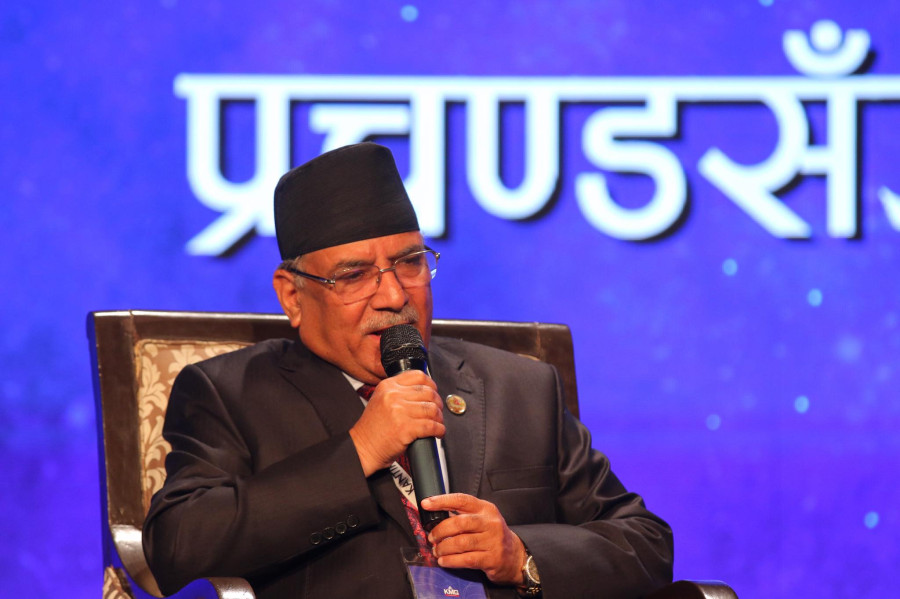Politics
Dahal describes his changing stance as characteristic of a dynamic leader
I don’t wish to become prime minister anytime soon, the ruling party co-chair says.
Binod Ghimire
Nepal Communist Party co-chair Pushpa Kamal Dahal on Saturday appeared in high spirits. He was critical of the government’s performance but asserted his bonding with party co-chair and Prime Minister KP Sharma Oli. He expressed his reservations about the Millenium Challenge Corporation’s Nepal Compact. He admitted that he plays to the gallery for votes. He denied allegations that he is an unstable leader. And he tried to assert that he is a dynamic leader.
Dahal was in conversation with Sudheer Sharma, editor-in-chief of the Post’s sister paper Kantipur, on the concluding day of the Kantipur Conclave.
“I don’t believe in sticking to certain dogmas,” said Dahal, when asked about his ever-changing opinions and statements. “I believe in dynamism.”
Dahal used the platform on Saturday, on the heels of the party’s Central Committee meeting after which he has emerged stronger in the party, to claim that he is the most dynamic among the current crop of leaders at present.
He even made light of the prime ministerial position, saying he does not wish to take the government helm any time soon.
Such statements from Dahal, however, are not new, given his proficiency in using public platforms for posturing.
Just until a few years ago, Oli was Dahal’s bete noire. Oli was the most vocal critic of the Maoist “people’s war”. In May 2016, Dahal abruptly pulled the rug from under Oli, making his government fall. But a year later, in 2017, he decided to join hands with Oli’s party to keep himself relevant.
“I am a person who believes in changing with the situation and the times,” said Dahal. “I believe in dynamism.”
Last year in August-September, Dahal suddenly brought up a deal between him and Oli, saying they had agreed to lead the government in turns. Oli was insistent he will serve for the full term. In November, the Secretariat meeting decided that Dahal will become the executive chairman and Oli will lead the government for the full term.
Dahal has since refrained from talking about the prime ministerial position. Instead, he has invested time in expanding his influence in the party. He has managed to bring some former UML leaders into his fold, ensuring a majority for him in the nine-member Secretariat, making the Oli camp uncomfortable.
On Saturday, Dahal said Oli should lead the government for the full term “to give the message of stability."
“I am ready to sacrifice the prime ministerial position forever if that takes the country on the path of prosperity,” he said.
Dahal also said there were proposals immediately after the election results were out that he could become the prime minister for a full five-year term. “But I rejected and moved ahead in the spirit of the agreement signed with the UML,” said Dahal, stopping short of saying who made those proposals.
Dahal is often criticised for giving up Maoism—based on which he led the decade-long insurgency that resulted in the deaths of 17,000 people.
“I dissolved the CPN (Mashal) when I was the general secretary back in the late 80s because I believed that time was not ripe to wage a war,” said Dahal. “We fought elections from the Janamorcha party and went to Parliament long before we launched the war.”
However, more than a decade since Dahal decided to lay down the arms, he has once again become a part of the system that he wanted to change, for which also he often faces censure.
Dahal also tried to defend his participation in religious and spiritual activities, saying he does that for votes.
On the MCC, which has vertically split the ruling Nepal Communist Party (NCP), Dahal said it must be ratified but he laid stress on seeking some clarity. “There should be a proper study and it should be endorsed if that is in the country’s interest. If there is a need for revision, we have to discuss it with the US government,” said Dahal. “There should also be clarity on how it is linked with the Indo-Pacific Strategy.”
He, however, eschewed the question why the political document presented at the Central Committee said “Indo-Pacific Strategy is the United States’ bid to counter China”, saying that particular line has now been removed.
On the government’s performance, Dahal said: “It is wrong to say the government has done nothing.”
“But it is also true that people’s expectations still remain addressed,” he said. “The government and the party need a serious self-reflection.”




 13.12°C Kathmandu
13.12°C Kathmandu














